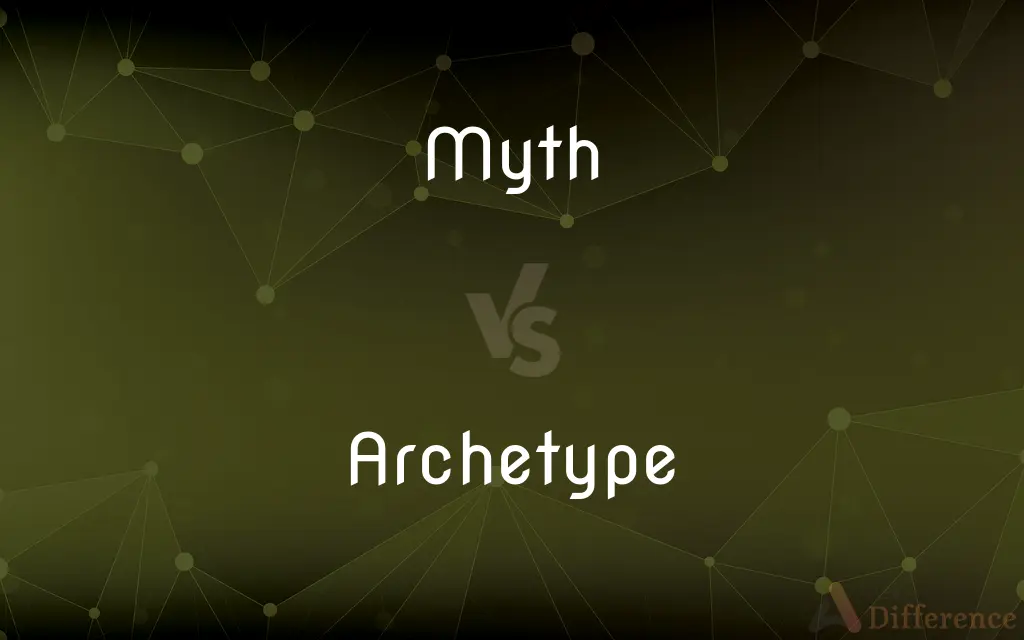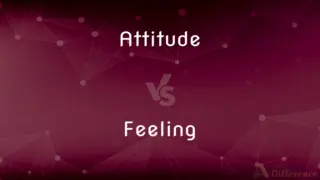Myth vs. Archetype — What's the Difference?

Difference Between Myth and Archetype
ADVERTISEMENT
Compare with Definitions
Myth
Myth is a folklore genre consisting of narratives that play a fundamental role in a society, such as foundational tales or origin myths. The main characters in myths are usually non-humans, such as gods, demigods, and other supernatural figures.
Archetype
An original model on which something is patterned
Myth
A traditional, typically ancient story dealing with supernatural beings, ancestors, or heroes that serves as a fundamental type in the worldview of a people, as by explaining aspects of the natural world or delineating the psychology, customs, or ideals of society
The myth of Eros and Psyche.
A creation myth.
Archetype
The concept of an archetype (; from Greek: ἄρχω, árkhō, 'to begin' + τῠ́πος, túpos, 'sort, type') appears in areas relating to behavior, historical psychology, and literary analysis. An archetype can be: a statement, pattern of behavior, prototype, "first" form, or a main model that other statements, patterns of behavior, and objects copy, emulate, or "merge" into.
Myth
Such stories considered as a group
The realm of myth.
ADVERTISEMENT
Archetype
A very typical example of a certain person or thing
He was the archetype of the old-style football club chairman
Myth
A popular belief or story that has become associated with a person, institution, or occurrence, especially one considered to illustrate a cultural ideal
A star whose fame turned her into a myth.
The pioneer myth of suburbia.
Archetype
(in Jungian theory) a primitive mental image inherited from the earliest human ancestors, and supposed to be present in the collective unconscious.
Myth
A fiction or half-truth, especially one that forms part of an ideology.
Archetype
A recurrent symbol or motif in literature, art, or mythology
Mythological archetypes of good and evil
Myth
A fictitious story, person, or thing
"German artillery superiority on the Western Front was a myth" (Leon Wolff).
Archetype
An original model or type after which other similar things are patterned; a prototype
"'Frankenstein' ... 'Dracula' ... 'Dr. Jekyll and Mr. Hyde' ... the archetypes that have influenced all subsequent horror stories" (New York Times).
Myth
A traditional story which embodies a belief regarding some fact or phenomenon of experience, and in which often the forces of nature and of the soul are personified; a sacred narrative regarding a god, a hero, the origin of the world or of a people, etc.
Archetype
An ideal example of a type; quintessence
An archetype of the successful entrepreneur.
Myth
(uncountable) Such stories as a genre.
Myth was the product of man's emotion and imagination, acted upon by his surroundings. (E. Clodd, Myths & Dreams (1885), 7, cited after OED)
Archetype
In Jungian psychology, an inherited pattern of thought or symbolic imagery derived from past collective experience and present in the individual unconscious.
Myth
A commonly-held but false belief, a common misconception; a fictitious or imaginary person or thing; a popular conception about a real person or event which exaggerates or idealizes reality.
Scientists debunk the myth that gum stays in the human stomach for seven years.
Archetype
An original model of which all other similar concepts, objects, or persons are merely copied, derivative, emulated, or patterned; a prototype.
Myth
A person or thing held in excessive or quasi-religious awe or admiration based on popular legend
Father Flanagan was legendary, his institution an American myth. (Tucson (Arizona) Citizen, 20 September 1979, 5A/3, cited after OED)
Archetype
An ideal example of something; a quintessence.
Myth
A person or thing existing only in imagination, or whose actual existence is not verifiable.
Archetype
(literature) A character, object, or story that is based on a known character, object, or story.
Myth
An invented story, theory, or concept.
Archetype
(psychology) According to Swiss psychologist Carl Jung: a universal pattern of thought, present in an individual's unconscious, inherited from the past collective experience of humanity.
Myth
A story of great but unknown age which originally embodied a belief regarding some fact or phenomenon of experience, and in which often the forces of nature and of the soul are personified; an ancient legend of a god, a hero, the origin of a race, etc.; a wonder story of prehistoric origin; a popular fable which is, or has been, received as historical.
Archetype
(textual criticism) A original manuscript of a text from which all further copies derive.
Myth
A person or thing existing only in imagination, or whose actual existence is not verifiable.
As for Mrs. Primmins's bones, they had been myths these twenty years.
Archetype
To depict as, model using, or otherwise associate an object or subject with an archetype.
Myth
A traditional story accepted as history; serves to explain the world view of a people
Archetype
The original pattern or model of a work; or the model from which a thing is made or formed.
The House of Commons, the archetype of all the representative assemblies which now meet.
Types and shadows of that glorious archetype that was to come into the world.
Archetype
The standard weight or coin by which others are adjusted.
Archetype
The plan or fundamental structure on which a natural group of animals or plants or their systems of organs are assumed to have been constructed; as, the vertebrate archetype.
Share Your Discovery

Previous Comparison
Capsaicin vs. Piperine
Next Comparison
Attitude vs. Feeling













































